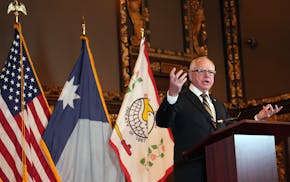Minnesota lawmakers managed to pass a $66 billion two-year budget through the most closely divided Legislature in state history, addressing a looming deficit and averting a partial government shutdown.
But it wasn't pretty. Legislators took three weeks longer than expected to finish their work, negotiated billions in spending behind closed doors and put scores of state employees on edge about potential layoffs.
The 2025 session was as rocky as any in recent memory. It started with an acrimonious boycott in the House and stretched into a special session after dissent from rank-and-file lawmakers imperiled a fragile budget agreement. Legislative leaders spent the weeks following the regular session's adjournment nailing down support from their members, some of them unaccustomed to compromise.
When they were done, a Legislature made up of 101 Democrats and 100 Republicans passed the budget, the first bonding bill to fund infrastructure projects since 2023, and a host of other items.
"I think it ended with much more accord than anyone could have predicted in January when the DFL wasn't even showing up," said Steven Schier, a political scientist and Carleton College professor emeritus. "I don't think people expected this to work out as well as it did."
The House erupted in applause when Speaker Lisa Demuth, R-Cold Spring, gaveled the chamber into adjournment just before 11 p.m. Monday. It was a welcome display of decorum in stark contrast to the 2024 session that ended in divisive fashion.
"We have proven that we can govern together," Demuth said of Democrats and Republicans in the first tied Minnesota House since 1979.
Neither Republicans nor Democrats got everything they wanted. Demuth said House Republicans successfully fought to cut spending and block tax increases, but they were unable to roll back a new program for paid family and medical leave that they believe will be a burden for employers.
Speaking to reporters in front of the House chamber Monday night, House DFL Leader Melissa Hortman teared up as she discussed a bill that stripped health care coverage from adult undocumented immigrants.
Tight majorities forced Hortman and DFL Senate Majority Leader Erin Murphy to cast votes in favor of the change to get the full budget over the finish line, even though they didn't personally support it.
"What I worry about is the people who will lose their health insurance. I know that people will be hurt by that vote, and I'm …" Hortman said, her voice breaking with emotion. "We worked very hard to try to get a budget deal that wouldn't include that provision, and we tried any other way we could to come to a budget agreement with Republicans, and they wouldn't have it."
Hortman, DFL-Brooklyn Park, said she was happy that Democrats protected other laws they enacted when they held full control of state government in 2023. They preserved funding increases for Minnesota schools, summer unemployment insurance for hourly school-year workers and the paid family and medical leave program.
"We got a state budget in place and we protected those wins from 2023," Hortman said.
Gov. Tim Walz praised Republican and Democratic colleagues alike Tuesday for overcoming the "narrowest of margins" to pass the budget, calling it "one of the most satisfying moments" in his two terms. Walz said he looked forward to signing all of the bills making up the state budget and wasn't sure it could happen anywhere else.
"D.C. is not able to do this," Walz said. "Democracy is strong and functioning in Minnesota."
DFL and GOP leaders faced intense pressure from their parties' flanks to not compromise on key priorities. A group of DFL lawmakers protested outside Walz's office when he and legislative leaders announced the budget deal would repeal health care coverage for adult undocumented immigrants. Some on the right criticized GOP lawmakers for agreeing to continue health care coverage for undocumented children.
Those decisions could haunt Hortman and Murphy, and possibly even some rank-and-file members, when they seek their parties' endorsements in next year's election, Schier said. Some could even face primary challenges.
"That's an important dividing line between what activists want and what the public will tolerate," Schier said. Legislators may be happy they got a budget across the finish line, he said, but "political consequences have yet to arrive."
Lawmakers will almost certainly face questions about their spending decisions in the coming months, since most major budget bills were negotiated in private. The work went behind closed doors after lawmakers adjourned May 19 without passing most budget bills, and only a couple of committees regularly met in public before Monday's special session.
Some committees met only once in public to reveal what was in the bills before a vote.
"We need to do a better job at how we do government in this state," Sen. Michael Kreun, R-Blaine, said on the Senate floor Monday. "We need to get away from backroom deals."
While legislators left the Capitol with the hope of not returning until their 2026 session, DFL leaders warned that another special session could be needed later this year if Congress passes a federal budget that includes Medicaid cuts.
"I'm worried that Congress will act in July and make deep cuts to Medicaid in particular, which will have an impact on the general fund here in the state of Minnesota," said Murphy, DFL-St. Paul. "And if they do that, if the cuts are as deep as they are talking about, we will have to come back to balance the budget and to change the law."
Murphy said her Republican colleagues "continue to say they don't believe it will happen" when she asks them about federal cuts.
Demuth said the issue doesn't need to be addressed until Congress acts and it's clear the state must respond.
"If there are implications and effects here in the state of Minnesota, we'll take a look at that and the governor would be able to call us back," Demuth said. "But right now, we were able to complete the work for the state of Minnesota before July 1, and there is no government shutdown."
Allison Kite of the Minnesota Star Tribune contributed to this story.

Trump and cabinet officials cite Minneapolis riots, Walz's response to justify troops in Los Angeles
'Hundreds' had ties to Feeding Our Future. Many may not face charges.

More than 55,000 Palestinians have been killed in the Israel-Hamas war, Gaza health officials say

Federal charges suggest tie between recent shootings outside Twin Cities high school grad ceremonies

